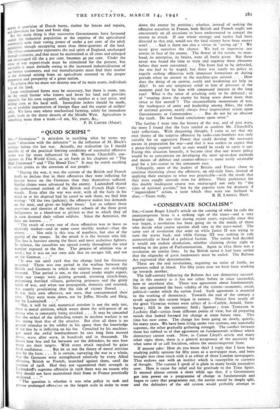SIR,—Perusal of the latter of Mr. C. S. Orwin's articles
on farming has had a most depressing effect on one who, living in the heart of agricultural England, is in intimate touch with the spirit of farm- workers of all classes, not least through association with them in the duties of the Home Guard, to which they have made such a magnificent response. He appears to regard farming purely on the lines of an industry rather than a way of life, and his proposals savour of the principles of rationalisation which has already done so much to accentuate unemployment. While I agree with him that there is much to be said for State ownership of the land it must also be admitted that there is an alternative in peasant-proprietorship, a position almost universal in the sixteenth century and only finally extinguished by successive enclosure acts some hundred years ago.
Nor can one agree that all landlords are greedy and have neglected their duties or that the recent guaranteed prices have resulted in large profits for farmers, though undoubtedly they have enabled some of them to discharge their debts. The bulk of the old type of hereditary landlords have disappeared through the burden of death duties, and their tenants bought their farms on borrowed money at the top of the market and are suffering for it. Agricultural credit is therefore a necessity. My own experience is that from two-thirds to three- quarters of the gross rents under the old system went back into the estates in provision of Dutch barns, timber for fences and repairs, and allowances for lime and basic slag. But the main thing is that successive Governinents have favoured induly the industrial population at the expense of the agricultural eenununity with their voting power of under 4 per cent. of the adult population, though occupying more than three-quarters of the land. The village-community represents the real spirit of England, unchanged through centuries, and that must be maintained at all costs and enlarged and encouraged till the 4 per cent. becomes 4o per cent. Under the stress of war export-trade must be stimulated for the present, but inevitably it must dwindle owing to the increased industrialisation of our former customers, and our manufacturers must ford their market in the demand arising from an agriculture restored to the proper proportion and prosperity of a great nation. To achieve this we must not destroy one of its main assets, individual. love of the land.
Large mechanised farms may be necessary, but there is room, too, for the small farmer who knows and loves his land and provides primarily for his own support, selling his surplus at a just price, and milling corn at his local mill. Immediate orders should be made, too, to prohibit importation of foreign flour and the export of millers' offals. We have seen where mechanised farming, solely for immediate profit, leads in the dusty deserts of the Middle West. Agriculture is something more than a trade.—I am, Sir, yours, &c.,
P. H. CARTER (Major).































 Previous page
Previous page